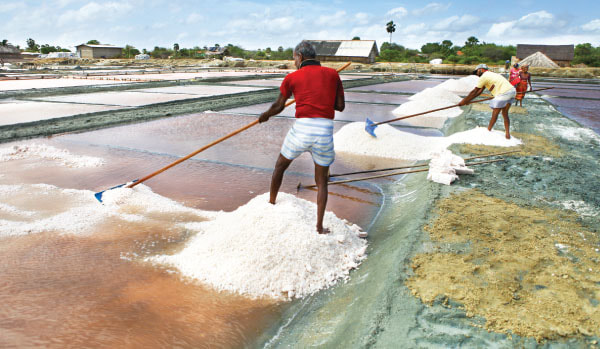|
Sea salt, table salt or kosher salt, whatever salt type you choose to use, only the name, taste, texture and processing varies while the sodium content remains the same. But advertising gimmicks have popularized sea salt and they have become extremely popular in restaurants and supermarket aisles.
Preparation Method of Table Vs Sea Salt Sea salt is prepared through evaporation of seawater with little or no processing at all and this is the reason for the presence of trace minerals such as magnesium, potassium, calcium and other nutrient. These minerals add flavor and color to sea salt which is sold in the market with different coarseness levels. Table salt is made from underground salt deposits with heavy processing done to remove all the minerals that might be present in it. Additives are also added to avoid clumping of table salt. Iodine, a nutrient required to maintain normal thyroid levels, is also added to table salt to increase its nutrient quotient. Nutrient Content of Table Vs Sea Salt In reality, sea salt and table salt have the same nutritional value although sea salt has been promoted as the healthier option. The minimal quantities of trace nutrients found in sea salt can be easily fulfilled by consuming other healthy foods, whereas the iodine added to table salt helps to prevent the iodine-deficiency disease goiter. In a survey conducted by a renowned organization, 61% individuals reported wrongly that sea salt is a lower sodium alternative to table salt. Table salt and most varieties of sea salt contain about 40% sodium by weight. The only difference is that kosher salt and sea salt may contain bigger crystals than table salt and hence, might contain less sodium by volume (when measured with a teaspoon or tablespoon). A teaspoon of table salt has about 2,300 milligrams of sodium while a teaspoon of kosher or sea salt might contain fewer crystals that fit into the spoon and hence, reduced sodium value. Better or Best? Are you still in doubt whether sea salt is better or best than the rest? Leave room for no doubts. When you are confused between choosing any of these salts, let your taste buds decide the best salt option as any salt type you select contains the same quantities of sodium. Gourmet chefs may prefer sea salt for its coarse, crunchy texture and strong flavor; manufacturers may use sea salt to prepare potato chips and other snacks advertising them to be more natural and less processed than table salt and some health-conscious individuals might choose sea salt for its magnesium content. Whatever salt you chose to use, consume it in moderation. Individuals who consume higher quantities of sea salt assuming it to contain lower sodium levels are at a higher risk of increased blood pressure levels. Almost 80 percent of sodium you consume every day is hidden from you in the form of processed foods. Your canned soups, chicken nuggets and pizzas contribute monumental amounts of sodium. Have a closer look at the salty foods by visiting the website www.firsteatright.com. Consume homemade foods to reduce elevated sodium levels. Prepare your own seasonings or even make a healthy pizza to fulfill your taste buds while restricting sodium intake. Comments are closed.
|
AVOID FRAUD. EAT SMART.+91 7846 800 800
AuthorDietitian & Nutritionist Dr. Nafeesa Imteyaz. Archives
November 2022
Categories
All
Dr. Nafeesa's Blog @blogspot |
- Home
- Written Testimonials
- Consult
- Clinics
- Blogs
-
Diet & Nutrition
- Diabetes Reversal
- IVF IUI not needed for PCOS PCOD Infertility
-
Medical Nutrition
>
-
Disease & Conditions
>
- Infertility | PCOS
- Diabetes Mellitus
- Cholesterol
- Hypothyroid
- Kidney Problems
- Hypertension
- Cardiovascular Diseases
- Liver Diseases
- Gastro intestinal disorder
- Cancer
- Metabolic Disorders
- Orthopedic Disorders
- Eating Disorders
- Dietary Recall
- Weight Record Filled By Clients
- Online Payment Transaction Details
- Online Clients Weight Check Form
- Our Program Package Service Charges
- Weight Record 2017 Clients
- Measurements sent by Clients
- Terms & Conditions Of Payment
- Thanks. Your Form is Submitted
- Video Testimonials
- Lifestyle & Wellness
- Lifestyle & Wellness Blog
- Allergy & Intolerance
- Weight Loss / Gain
- Weight Loss / Slimming Blog
-
Disease & Conditions
>
- Life Cycle Nutrition >
- Sports Nutrition >
- Integrity in Nutrition
- Knowledge Centre
© COPYRIGHT 2022. ALL RIGHTS RESERVED. FRST HEALTHCARE PVT LTD.
Dr. Nafeesa Imteyaz of First Eat Right clinic, is the Best Dietitian Nutritionist in Bangalore. Best Dietitian Nutritionist in Pune. Best Dietitian Nutritionist in Hyderabad. Best Dietitian Nutritionist in Chennai. Best Dietitian Nutritionist in Mumbai. Best Dietitian Nutritionist in Delhi. Best Dietitian Nutritionist in Kolkata.


